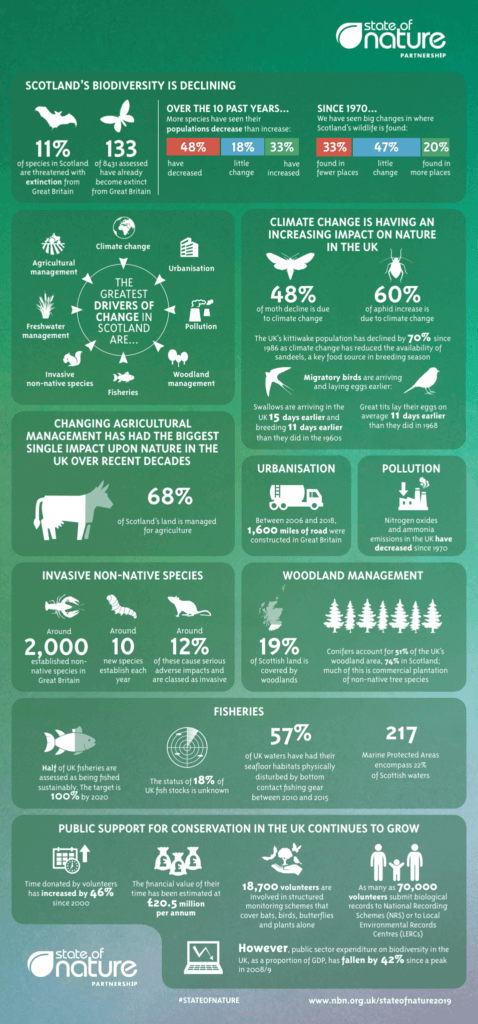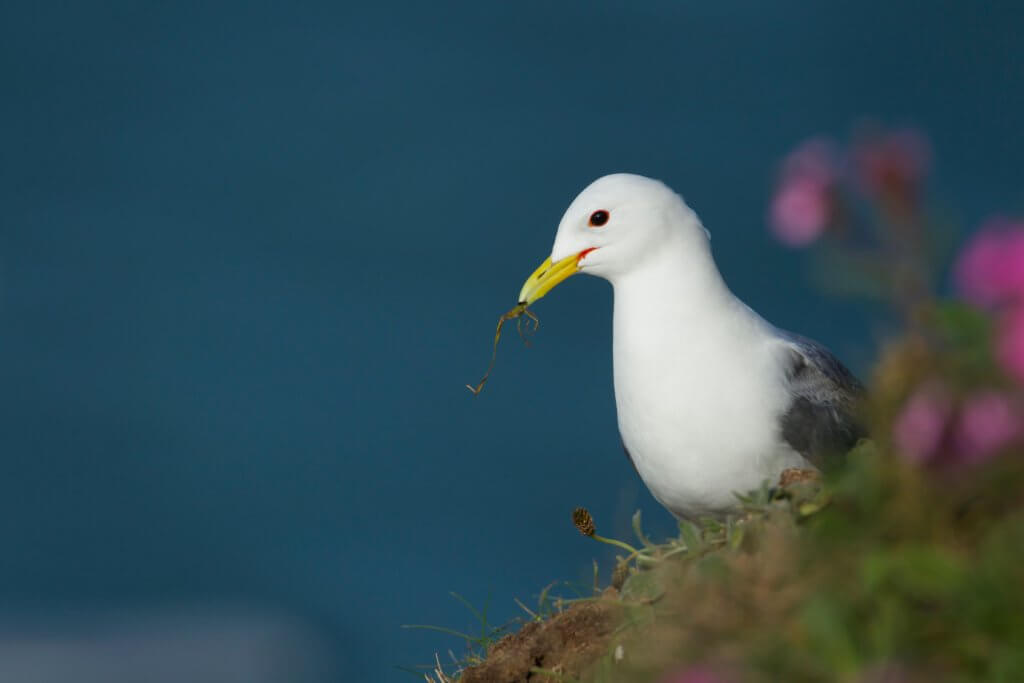Urgent action needed to halt continued decline of Scotland’s wildlife.
Scotland’s wildlife continues to decline, according to the most comprehensive State of Nature report ever produced.

The latest findings show that in the five decades since consistent scientific monitoring began there has been a 24% decline in average species abundance across monitored wildlife. The report confirms that averaged across all wildlife groups the decline continues unabated.
Following on from State of Nature reports in 2013 and 2016, leading professionals from more than 70 wildlife organisations have for the first time joined with Government agencies to present the clearest picture to date of the status of species across the land and sea.
The State of Nature Scotland report 2019 reveals that since recording began 49% of Scottish species have decreased, 28% have increased. Nature is changing rapidly, with 62% of species showing strong changes. Of the 6,413 species found in Scotland that have been assessed 11% have been classified as threatened with extinction from Scotland.
Experts also conclude that it is not too late to act. Much is known about the causes of decline and about some of the ways in which we could reduce impacts and help struggling species. The evidence from the last 50 years shows that significant and ongoing changes in the way we manage land and sea, and the ongoing effects of climate change are having the biggest impacts on nature.
Moths have been particularly hard hit in Scotland with numbers down by 25% in abundance. Butterflies meanwhile have shown a slight increase in average abundance of 9%. Of nine mammal species assessed since 1998 their abundance has also declined by 9%. In 2018 the wildcat was declared functionally extinct in Scotland, though conservation efforts using captive-bred genetically pure animals continue. The pine marten however has made a strong return in both abundance and distribution in recent years.
Overall the 143 species of birds assessed in Scotland appear broadly stable on average. Looking at specific bird groups however reveals a more complex picture.
Scotland’s globally significant seabird populations have undergone very substantial declines over the last 30 years. Whilst the monitoring period is shorter – running from 1986 to the most recent estimate in 2016 – the average numbers of 12 species of breeding seabirds have declined by 38%. Surface feeding birds like kittiwake, or species that depend on them to find prey, such as Arctic skua, have been particularly affected, with major declines of 72% and 77% respectively.

Invasive non-native species and pollution are also a problem. Despite welcome recent efforts to improve how people move and release non-native species, and how we respond once they establish, non-native species continue to arrive and spread in key Scottish habitats. Whilst emissions of many pollutants have been reduced dramatically in recent decades, pollution continues to have a severe impact on Scotland’s sensitive habitats and freshwaters, and new pollution threats are continuing to emerge.
The State of Nature 2019 report builds on the UK Committee on Climate Change (CCC) advice to governments published earlier this year, recommending stringent emissions reductions by 2050, and the Intergovernmental Science-Policy Platform on Biodiversity and Ecosystem Services (IPBES) global assessment in May showing unprecedented global declines in nature.
Scotland’s first minister Nicola Sturgeon declared a climate emergency in April, and in May addressed the related biodiversity crisis, saying that ‘The challenges facing biodiversity are as important as the challenge of climate change, and I want Scotland to be leading the way in our response.‘.
With a key meeting of the global Convention on Biological Diversity planned for April 2020 in Edinburgh, and with Glasgow hosting the UN Climate Change summit later the same year, the world’s eyes will be on Scotland and how we build that leading role. We are well placed to do so. Our most characteristic habitats, like the extensive Scottish peatlands, can and must play a key role in simultaneously tackling both Carbon storage and biodiversity challenges. The Scottish Government and SNH have already taken a progressive lead in funding and supporting positive work on peatlands at landscape scales. If we can extend that model out to wider habitats and species, our lead by example will be secured.
Paul Walton, lead author on the Scotland report, said: ‘This report draws on the best available data on Scotland’s biodiversity, produced by partnerships between conservation NGOs, research institutes, government and agencies, and thousands of dedicated volunteers. The output confirms that, averaged across species, the erosion and loss of nature in Scotland continues. But it also highlights how much we still have to lose, and some of the incredible work that is already underway to hold on to it. Scotland is uniquely placed to set a global example in responding to the twin climate and ecological crises. We must invest our ingenuity to integrate policies, to devise complementary solutions, to cooperate across sectors and tackle these twin global crises simultaneously. We must, critically see a step change in how we resource the conservation of all our biodiversity and develop nature-based approaches to climate change. If we do so, we can lead the way towards the transformative change that nature demands.’.
The report has a foreword by a collective of young conservationists who are passionate about conservation and the future of our wildlife and nature to preserve it for future generations.
Dan Rouse, a young conservationist said, ‘Nature is something that shaped my childhood, that allowed me to be free to use my sense of wonder, and to gain an insight into the wonderful world of nature! It’s young people that are now picking up the baton to save our nature – we’ve already lost Corn Buntings and Nightingales in Wales – how long until they’re gone from the rest of the UK? Along with the eerie calls of curlew and the gentle purr of the turtle doves.‘.
For a full copy of the State of Nature 2019 report and to find out how you can do your bit to save UK wildlife – www.nbn.org.uk/stateofnature2019
Ends
The State of Nature 2019 UK partnership includes: A Focus On Nature, A Rocha, Action for Conservation, Amphibian and Reptile Conservation (ARC), Association of Local Environmental Records Centres (ALERC), Badenoch & Strathspey Conservation Group, Bat Conservation Ireland, Bat Conservation Trust (BCT), Biodiversity Ireland, Biological Records Centre (BRC), Botanical Society of Britain and Ireland, British Arachnological Society (BAS), British Bryological Society (BBS), British Dragonfly Society (BDS), British Lichen Society, British Mycological Society (BMS), British Pteridological Society (BPS), British Trust for Ornithology (BTO), Buglife, Bumblebee Conservation Trust, Butterfly Conservation, Centre for Ecology & Hydrology (CEH), Chartered Institute of Ecology and Environmental Management (CIEEM), Chester Zoo, Conchological Society of Great Britain and Ireland, Continuous Plankton Recorder, Durrell Wildlife Conservation Trust (Durrell), Earthwatch, Freshwater Habitats Trust, Friends of the Earth, Froglife, Isle of Man Government, iSpot (The Open University), Jersey Government Department of the Environment, John Muir Trust, Joint Nature Conservation Committee (JNCC), Local Environmental Records Centre Wales, Mammal Society, Manx BirdLife, Marine Biological Association (MBA), Marine Conservation Society, Marine Ecosystems Research Programme, MARINELife, National Biodiversity Network (NBN), National Forum for Biological Recording, CEDAR Centre for Environmental Data and Recording, National Trust, National Trust for Scotland, Natural England (NE), Natural History Museum, Natural Resources Wales (NRW), Northern Ireland Bat Group, Northern Ireland Environment Agency (NIEA), ORCA, People’s Trust for Endangered Species (PTES), Plantlife, Royal Botanic Gardens Edinburgh, Royal Botanic Gardens Kew, Royal Society for the Protection of Birds (RSPB) Royal Zoological Society of Scotland, Scottish Badgers, Scottish Natural Heritage (SNH), Scottish Environment Link, Scottish Wild Land Group, Shark Trust, States of Guernsey, The Fungus Conservation Trust, Trees for Life, Ulster Wildlife Trust, University of Plymouth, University of Sheffield, Vincent Wildlife Trust, Whale and Dolphin Conservation (WDC), Wildfowl & Wetlands Trust (WWT), Wildlife Trusts, Scottish Wildlife Trust, Woodland Trust, WWF, Zoological Society of London (ZSL)
[registration_form]